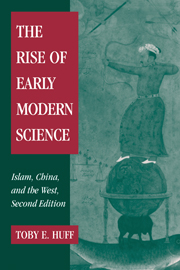Book contents
- Frontmatter
- Dedication
- Contents
- List of illustrations
- Preface to the second edition
- Preface to the first edition
- Acknowledgments
- Introduction
- 1 The comparative study of science
- 2 Arabic science and the Islamic world
- 3 Reason and rationality in Islam and the West
- 4 The European legal revolution
- 5 Madrasas, universities, and science
- 6 Cultural climates and the ethos of science
- 7 Science and civilization in China
- 8 Science and social organization in China
- 9 The rise of early modern science
- Epilogue: educational reform and attitudes toward science in the Muslim world and China since the eighteenth century
- Selected bibliography
- Index
4 - The European legal revolution
Published online by Cambridge University Press: 05 June 2016
- Frontmatter
- Dedication
- Contents
- List of illustrations
- Preface to the second edition
- Preface to the first edition
- Acknowledgments
- Introduction
- 1 The comparative study of science
- 2 Arabic science and the Islamic world
- 3 Reason and rationality in Islam and the West
- 4 The European legal revolution
- 5 Madrasas, universities, and science
- 6 Cultural climates and the ethos of science
- 7 Science and civilization in China
- 8 Science and social organization in China
- 9 The rise of early modern science
- Epilogue: educational reform and attitudes toward science in the Muslim world and China since the eighteenth century
- Selected bibliography
- Index
Summary
Ever since the appearance of Charles Homer Haskins's classic study, The Renaissance of the Twelfth Century, scholars have known that the twelfth and thirteenth centuries experienced an extraordinary efflorescence of creativity and new cultural forms. Charles Haskins, Hastings Rashdall, F. W. Maitland, and other scholars were certainly aware of the revival of the study of law and its impact on the development of the university, and even the impact of legal studies on the church and canon law. But with the publication of Harold J. Berman's book, Law and Revolution, we were reminded as perhaps never before of the extraordinary revolutionary nature of the legal and institutional reforms that erupted and swept across Europe during this period. Professor Berman's fresh account, based on the harvest of legal scholarship since the 1930s, brings to light the centrality of the sweeping legal reforms, indeed, the revolutionary reconstruction, of all the realms and divisions of law – feudal, manorial, urban, commercial, and royal – and therewith the reconstitution of medieval European society. It is this great legal transformation that laid the foundations for the rise and autonomous development of modern science.
At the center of this development one finds the legal and political principle of treating collective actors as a single entity – a corporation. Some social theorists have recognized that the existence of these “new corporate actors” changes the nature of social action, creating new social and economic dynamics that must be accounted for by revised social, economic, and political theories. The emergence of corporate actors was unquestionably revolutionary in that the legal theory which made them possible created a variety of new forms and powers of association that were in fact unique to the West, since they were wholly absent in Islamic as well as Chinese law. Furthermore, the legal theory of corporations brings in its train constitutional principles establishing such political ideas as constitutional government, consent in political decision making, the right to political and legal representation, the powers of adjudication and jurisdiction, and even the power of autonomous legislation.
- Type
- Chapter
- Information
- The Rise of Early Modern ScienceIslam, China and the West, pp. 118 - 146Publisher: Cambridge University PressPrint publication year: 2003



